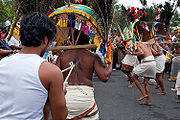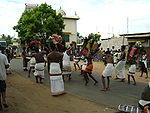
Kavadi
Encyclopedia

Murugan
Murugan also called Kartikeya, Skanda and Subrahmanya, is a popular Hindu deity especially among Tamil Hindus, worshipped primarily in areas with Tamil influences, especially South India, Singapore, Sri Lanka, Malaysia, Mauritius and Reunion Island. His six most important shrines in India are the...
, the Tamil
Tamil people
Tamil people , also called Tamils or Tamilians, are an ethnic group native to Tamil Nadu, India and the north-eastern region of Sri Lanka. Historic and post 15th century emigrant communities are also found across the world, notably Malaysia, Singapore, Mauritius, South Africa, Australia, Canada,...
God of War. It is often performed during the festival of Thaipusam
Thaipusam
Thaipusam is a Hindu festival celebrated mostly by the Tamil community on the full moon in the Tamil month of Thai . It is celebrated not only in countries where the Tamil community constitutes a majority, but also in countries where Tamil communities are smaller, such as Singapore and Malaysia...
and emphasizes debt bondage. The Kavadi itself is a physical burden through which the devotees implore for help from the God Murugan
Murugan
Murugan also called Kartikeya, Skanda and Subrahmanya, is a popular Hindu deity especially among Tamil Hindus, worshipped primarily in areas with Tamil influences, especially South India, Singapore, Sri Lanka, Malaysia, Mauritius and Reunion Island. His six most important shrines in India are the...
.
Origin


Shiva
Shiva is a major Hindu deity, and is the destroyer god or transformer among the Trimurti, the Hindu Trinity of the primary aspects of the divine. God Shiva is a yogi who has notice of everything that happens in the world and is the main aspect of life. Yet one with great power lives a life of a...
entrusted the dwarf saint sage Agastya with two hillocks, with instructions to carry and install them in South India. But the sage left them in a forest and later asked his disciple, Idumban to get them. Idumban found the two hillocks, but could not initially lift them, until he obtained divine help. Near Palani in South India – where to this day there is a famous shrine of Murugan — Idumban put the hillocks down to rest awhile. When he attempted to continue with his journey, he found that the hillocks were immovable.
Idumban sought the help of a scantily dressed youth, but the youth claimed the hillocks belonged to him. In the ensuing scuffle, Idumban was defeated. Idumban then realised that the youth was Lord Murugan. Idumban pleaded to be pardoned and asked that anyone who comes to the hills to worship Murugan with an object similar to the two hillocks suspended by a rod, may be granted his heart’s desire. Idumban’s wish was granted. And so the kavadi came to play its role in Hindu
Hindu
Hindu refers to an identity associated with the philosophical, religious and cultural systems that are indigenous to the Indian subcontinent. As used in the Constitution of India, the word "Hindu" is also attributed to all persons professing any Indian religion...
festivals.
Description of Kavadi
The Kavadi consists of two semicircular pieces of wood or steel which are bent and attached to a cross structure that can be balanced on the shoulders of the devotee. It is often decorated with flowers, peacock feathers (the vehicle of God Murugan) among other things. Some of the Kavadis can weigh up to 30 kg.Preparation
The preparations start 48 days prior to the two day ThaipusamThaipusam
Thaipusam is a Hindu festival celebrated mostly by the Tamil community on the full moon in the Tamil month of Thai . It is celebrated not only in countries where the Tamil community constitutes a majority, but also in countries where Tamil communities are smaller, such as Singapore and Malaysia...
festival. The devotees purge themselves of all mental and physical impurities. They take only one vegetarian meal per day and 24 hours prior to Thaipusam
Thaipusam
Thaipusam is a Hindu festival celebrated mostly by the Tamil community on the full moon in the Tamil month of Thai . It is celebrated not only in countries where the Tamil community constitutes a majority, but also in countries where Tamil communities are smaller, such as Singapore and Malaysia...
, they must maintain a complete fast. The devotees prepare themselves by following strict purification austerities that include:
- Transcendence of desire
- Shaving of the head
- Following a vegetarian diet and refraining from alcohol
- Sexual abstinence
- Bathing in cold water
- Sleeping on the floor
- Regular prayers
Vel Kavadi
The most spectacular practice is the vel kavadi, essentially a portable altar up to two meters tall, decorated with peacock feathers and attached to the devotee through 108 vels pierced into the skin on the chest and back. Fire walking and flagellationFlagellation
Flagellation or flogging is the act of methodically beating or whipping the human body. Specialised implements for it include rods, switches, the cat o' nine tails and the sjambok...
may also be practiced. It is claimed that devotees are able to enter a trance
Altered state of consciousness
An altered state of consciousness , also named altered state of mind, is any condition which is significantly different from a normal waking beta wave state. The expression was used as early as 1966 by Arnold M. Ludwig and brought into common usage from 1969 by Charles Tart: it describes induced...
, feel no pain, do not bleed from their wounds and have no scars left behind.
However, some of the more extreme masochistic practices have been criticized as dangerous and contrary to the spirit and intention of Hinduism.
Other types of Kavadi
Not all Kavadi involve extreme physical endurance. Some devotees also carry a brass jug of milk (Pal Kavadi) on their heads while others carry small pots with offerings for their deity.Kavadi in the West
Kavadi is practiced by Modern PrimitivesModern Primitives
Modern Primitives may refer to:*modern primitives, people in modern society who engage in body modification with ritual purpose*Modern Primitives , a 1989 RE/SEARCH book about body modification by V. Vale and Andrea Juno...
in the West for those seeking healing and spiritual transformation. This practice continues annually.

